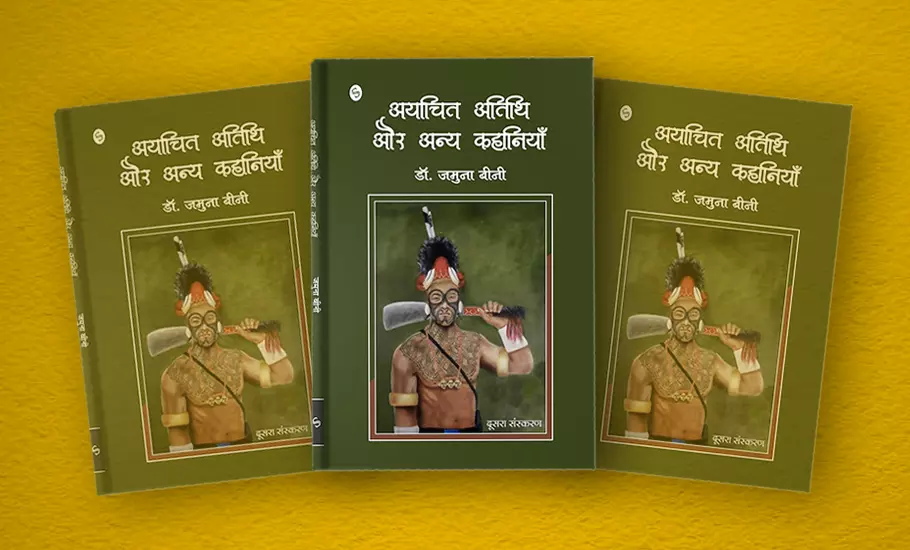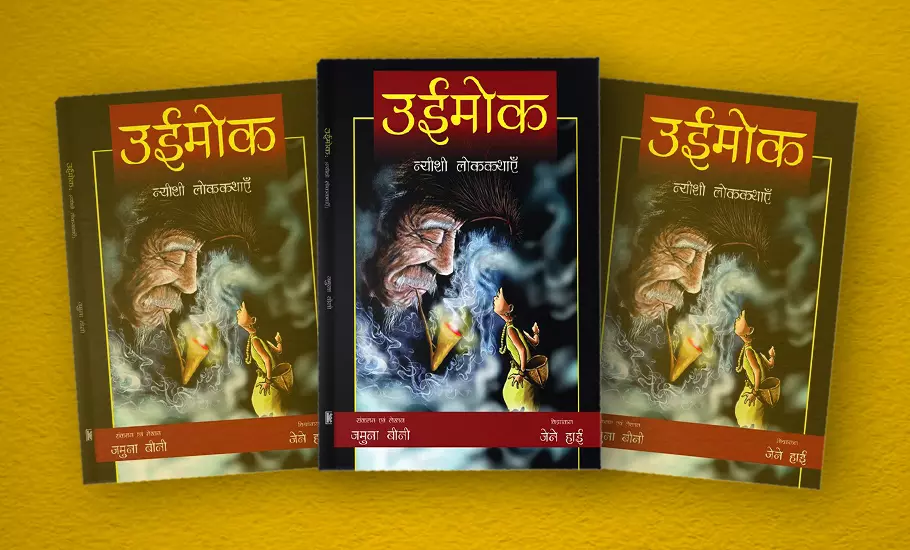
- Home
- India
- World
- Premium
- THE FEDERAL SPECIAL
- Analysis
- States
- Perspective
- Videos
- Sports
- Education
- Entertainment
- Elections
- Features
- Health
- Business
- Series
- In memoriam: Sheikh Mujibur Rahman
- Bishnoi's Men
- NEET TANGLE
- Economy Series
- Earth Day
- Kashmir’s Frozen Turbulence
- India@75
- The legend of Ramjanmabhoomi
- Liberalisation@30
- How to tame a dragon
- Celebrating biodiversity
- Farm Matters
- 50 days of solitude
- Bringing Migrants Home
- Budget 2020
- Jharkhand Votes
- The Federal Investigates
- The Federal Impact
- Vanishing Sand
- Gandhi @ 150
- Andhra Today
- Field report
- Operation Gulmarg
- Pandemic @1 Mn in India
- The Federal Year-End
- The Zero Year
- Science
- Brand studio
- Newsletter
- Elections 2024
- Events
How award-winning writer Jamuna Bini is popularising tales of Arunachal Pradesh through Hindi

In the literary landscape of India, writers from Arunachal Pradesh feature the least. This is not to exaggerate the situation but to state the reality as it is even if it is bitter.Over several decades, the small but steadily growing writers’ community from the Himalayan state is constantly churning out book after book—it may not be with lightning speed, but thoughtful enough to...
In the literary landscape of India, writers from Arunachal Pradesh feature the least. This is not to exaggerate the situation but to state the reality as it is even if it is bitter.
Over several decades, the small but steadily growing writers’ community from the Himalayan state is constantly churning out book after book—it may not be with lightning speed, but thoughtful enough to highlight what makes the far-flung northeastern state unique with great literary sensibility.
The writers of Arunachal Pradesh are polyphonic—they write in different languages like Assamese, English and Hindi. Many compose prose, poetry and non-fiction in their native dialects with the help of Roman or Devanagari scripts.
Only the Monpa and Khamti tribes have their scripts. They are called Bhoti and Lik Tai respectively.
There are 26 major tribes and hundreds of sub-tribes in the state. Together they have more than 90 dialects. And each dialect for hundreds of years has been bequeathing the subsequent generations its diverse folktales, folklores and folksongs culminating in a rich oral literature for the beautiful state.

Among the new crop of writers is Jamuna Bini. The 39-year-old, who belongs to the Nyishi tribe, writes in Hindi and her mother tongue. But it's Hindi that helped her to reach out to readers globally. Bini writes fiction, non-fiction and poetry. She wrote her first poem as a child of 12.
Over the years, she has published five books. Among them are ‘Jab Adivasi Gata Hai’ (When Tribals Sing, a poetry collection), Uii Mok: Nyishi Lok Kathayein (Uii Mok: A collection of Nyishi folktales) and Ayachit Athithi Tatha Anya Kahaniya (Unwanted guest and other stories, a short story collection).
Her writings have been translated into various languages, including Malayalam, Assamese, English, Marathi, Santhali, Gujarati, Telugu, Turkish, Spanish, Arabic, Mandarin and Bulgarian.
Her writings mostly focus on tribal identity and its unique and exquisite culture and history. She was awarded the Yuva Katha Samman award a few months ago.
The prestigious award is annually conferred to an outstanding writer in memory of the renowned Hindi short story writer and critic, Dr Vijaymohan Singh. She got the award for her book, Ayachit Athithi Tatha Anya Kahaniya.
Bini was also honoured with the International Ambassador of Peace by the World Literary Forum for Peace and Human Rights in 2021. Along with writing, Bini is a teacher. She works as an assistant professor in the Department of Hindi at the Rajiv Gandhi University in Doimukh, located on the outskirts of Itanagar, the state's capital,
When asked why she chose Hindi as a medium to tell stories, Bini did not have a "direct answer". It is her love for Hindi but at the same time, it also reflects the dominant nature of English and Hindi as a mode of communication for the residents of the frontier state.
Earlier Assamese — the native language of the neighbouring state, Assam, played a huge role. It was the medium of instruction in schools too like Hindi and English are today. Thus the first few writers of Arunachal Pradesh like Lummer Dai and YD Thongchi wrote in Assamese. Their works are legendary.

As every tribe has its dialect, Arunachal Pradesh does not have a common language. Mostly the tribes speak with each other in "Arunachali Hindi". It is a creole mostly Hindi with words of English, tribal dialects and Assamese coming together. It is also spoken with a unique accent reflecting the rhythm and voice modulation of indigenous dialects. But Bini writes in shudh (pure) Hindi (literary Hindi).
"As a child, I was a voracious reader. I mostly read English classics by the likes of Charles Dickens, Jane Austen and Shakespeare. I have always loved reading and writing. However, in our tribal society, reading and writing are not commonly practised. The literacy rate is still low here compared to other states," Bini told The Federal.
As per the Census 2011, Arunachal Pradesh has the second-lowest literacy rate in the country. Bihar has the lowest literacy rate in India at 61.80 per cent.
The literacy rate in Arunachal Pradesh is 65.38 per cent. The male literacy rate is 72.55 per cent, while female literacy is 57.70 per cent.
"My love for Hindi began as a student. During my class ten board exams, I prepared a lot to do well in Hindi as there was a popular concept that students from Arunachal Pradesh are weak in the language. My hard work paid off and I scored 90 per cent in the subject," she added.
What started as an attempt to "myth breaking" laid the foundation for a writer and scholar who deeply understands the virtues of the language to bring out some of the best stories from the hill state.
The award-winning author even makes the challenges faced by a writer look easy. Hindi is her "adopted language" and she has developed ways to cross the barriers whenever a "complex literary situation arises".
For instance, when she was writing her Nyishi folktales collection, Uii Mok: Nyishi Lok Kathayein.
Uii Mok in Nyishi stands for "the land of ancestors or the land of the dead". The Arunachali tribe believes that after a person dies she goes to the land of ancestors. The deceased continues to perform her daily activities as she did while living on the earth.
While writing the book, Bini decided to use Uii Mok as its title as it is the most appropriate word she thought to describe the collection in a nutshell. There is also a folktale Uii Mok in the collection. However, she could not find a Hindi word to complement Uii Mok. So she kept the Nyishi word as it is with a footnote to tell readers what it stands for.
“You can’t translate every word and term of tribal dialects to English or Hindi. These words and terms are unique and rooted in Arunachal Pradesh. In such a situation, I don't interfere much and let the stories speak for themselves. I want my stories to be as authentic as possible.
"For instance, while writing a story about the eastern Arunachali tribe, Wancho, I kept the original Wancho word, Jhukpa. Jhukpa is a huge area close to a forest where the Wanchos make a raised bamboo platform—machang. In that raised platform they leave the dead bodies wrapped in clothes and bamboo mats to get rotten or eaten by wild animals and birds. They did not have the custom of burying or lighting a pyre for the dead. Over the decades, a lot of Wanchos have converted to Christianity so they bury their dead now," added Bini.
As the writer and scholar described her ways of finding meaning and authenticity in telling stories of Arunachal Pradesh in Hindi, she broke into a hearty laughter. Those from Arunachal Pradesh or those who have stayed in the hill state know that the "hearty laughter" from the belly is a sign of tribal innocence, especially of women. They are honest and free as their laughter without any inhibitions.
Bini also stressed that often tribal words and terms when written in English or Hindi get completely changed (even meaning-wise) as the phonetics are very different. Thus there lies a risk of distortion.
Delving into the issue of "Hindi imposition" in the Himalayan state known for its mountains and rivers, Bini said because of the dominant nature of English and Hindi, the younger generations find these languages more attractive and a sign of being "educated and modern".
"So they don't speak their mother tongues much. It is sad because I insist on speaking in Nyishi with my son, Gogol, at home. I never talk to him in English or Hindi. One good thing that has come out of the issue is that several tribal organisations are working with government departments to create a curriculum in local dialects to be taught to students till class five. Or else, slowly our dialects will die. We need our tribal dialects to keep our oral history, tradition and culture alive," she added.
In 2006, when veteran writer YD Thongchi founded the Arunachal Pradesh Literary Society or APLS in Itanagar, the rich oral literature of various tribes got a strong scaffolding to stand on. Over the years, the literary club grew and now has branches in at least 14 districts.
While Padmashree awardee Thongchi is the president of the APLS, Bini is its vice president. English author Mamang Dai--also lovingly called the national treasure by critics--is the advisor of the literary society. "Every second Sunday of the month, we all meet. There is no language barrier in the society. The members of society are writers, readers and listeners. We sit and read new writings published by authors from the state. It is not just fiction or poetry we discuss, a lot of us also write non-fiction, criticism and journalistic pieces. So it is a diverse group. We always have great rendevous as reading and writing are always about joy and sharing of strong human bond," signed off Bini.
